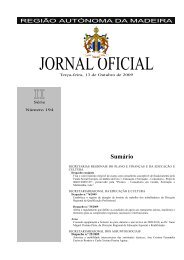Industrial Relations in Europe 2012 - European Commission - Europa
Industrial Relations in Europe 2012 - European Commission - Europa
Industrial Relations in Europe 2012 - European Commission - Europa
You also want an ePaper? Increase the reach of your titles
YUMPU automatically turns print PDFs into web optimized ePapers that Google loves.
3.8 <strong>Industrial</strong> conflict and settlement of disputes<br />
As noted above and <strong>in</strong>troduced <strong>in</strong> chapter 1 of this report, the right to strike is the most problematic<br />
issue for public sector employees throughout the EU (Clauwaert and Warneck 2008: 22-23).<br />
Restrictions often apply, although with notable variations across countries and different groups of<br />
public employees. In general, central government employees (defence, police, magistrates) and<br />
career civil servants are more frequently subject to limitations, if not simply forbidden to take<br />
<strong>in</strong>dustrial action. However, special regulations can also be found <strong>in</strong> various countries for other<br />
groups of employees, especially those provid<strong>in</strong>g essential public services such as health services,<br />
education, and transport. In the latter case, restrictions usually apply irrespective of the public or<br />
private nature of the provider and of the legal employment status of employees; moreover, they<br />
have different characteristics depend<strong>in</strong>g upon whether the right to strike is constitutionally<br />
protected (as <strong>in</strong> Italy, France, Spa<strong>in</strong> and Greece) or not.<br />
Apart from the armed forces, police and the judiciary, severe restrictions or explicit prohibition on<br />
tak<strong>in</strong>g strike action <strong>in</strong> the case of career civil servants exist <strong>in</strong> several countries such as Germany,<br />
Austria, Belgium, Bulgaria, Denmark, Estonia, Hungary, Latvia, and Poland. The case of German<br />
Beamte is probably the clearest example <strong>in</strong> po<strong>in</strong>t, while <strong>in</strong> Estonia and Austria the right to strike is<br />
either banned or has a very uncerta<strong>in</strong> status for all public employees. Contractual employees can<br />
usually take <strong>in</strong>dustrial action related to contract renewal, although they are often subject to peace<br />
obligation clauses dur<strong>in</strong>g the period of validity of collective agreements (as <strong>in</strong> Germany, Denmark<br />
and other Nordic countries, Bulgaria, Czech Republic, and Ireland). Such clauses do not exist <strong>in</strong><br />
countries such as Italy, France, Luxembourg, Slovakia, the UK, and, of course, <strong>in</strong> countries where<br />
formal collective agreements are excluded for all or groups of public employees.<br />
In several countries special rules exist, for <strong>in</strong>stance regard<strong>in</strong>g advance notice before tak<strong>in</strong>g<br />
<strong>in</strong>dustrial action, or the provision of m<strong>in</strong>imum services to be guaranteed <strong>in</strong> case of a strike, as <strong>in</strong><br />
Italy, Luxembourg, Slovenia, Lithuania, and Hungary. These rules may refer to ‘essential public<br />
services’ or to services of ‘special public <strong>in</strong>terest’, irrespective of the public or private nature of the<br />
employer and the legal status of the employees. The Italian legislation, for <strong>in</strong>stance, def<strong>in</strong>es as<br />
essential public services, irrespective of the legal status of the provider, all those services which aim<br />
to satisfy the constitutionally protected rights of the person to life, safety, health, mobility,<br />
education, <strong>in</strong>formation, to name but a few (law 146/1990, amended <strong>in</strong> 2000). A similar regulation<br />
was approved <strong>in</strong> France <strong>in</strong> 2007. In Hungary, the right to strike was curtailed <strong>in</strong> 2011 by requir<strong>in</strong>g<br />
prior agreement between the parties on ‘adequate services’ (Hámori and Kӧllὄ <strong>2012</strong>: 183).<br />
Other special regulations or <strong>in</strong>stitutions relate to the procedures used to handle collective disputes <strong>in</strong><br />
the public sector. In some countries special conciliation, mediation and arbitration procedures for<br />
the civil service exist, as <strong>in</strong> Denmark, F<strong>in</strong>land, Ireland, Netherlands, Norway, and Greece<br />
(Bordogna 2007). In Norway, where not only employees with ord<strong>in</strong>ary contracts but also civil<br />
servants have the right to strike, mediation is always compulsory <strong>in</strong> the state sector and arbitration<br />
is compulsory for senior civil service (Stokke 2002). In Netherlands, a special Advisory and<br />
Arbitration Board (Aac) dates from 1994. In Denmark, two arbitration systems for all public<br />
servants exist, based on different laws: one is a discipl<strong>in</strong>ary court for statutory civil servants (the<br />
Civil Servants’ Discipl<strong>in</strong>ary Court), while the other is an <strong>in</strong>dustrial relations court for staff covered<br />
by collective agreements. For contractual staff there is, moreover, the Independent Public<br />
Conciliator, to which social partners can take a matter concern<strong>in</strong>g a conflict of <strong>in</strong>terest if they are<br />
unable to reach an agreement (Andersen at al. 1999; Stokke 2002). In Ireland, a scheme of<br />
conciliation and arbitration for the civil service was <strong>in</strong>troduced <strong>in</strong> 1950, with a third party dispute<br />
resolution <strong>in</strong>stitution (the Civil Service Arbitration Board) and jo<strong>in</strong>t councils for conciliation<br />
purposes. Such formal mechanisms of conflict resolution for collective disputes do not exist <strong>in</strong><br />
Germany, where mediation agreements are concluded by the autonomous social partners or by<br />
decisions of the courts (Keller 1999).<br />
150

















